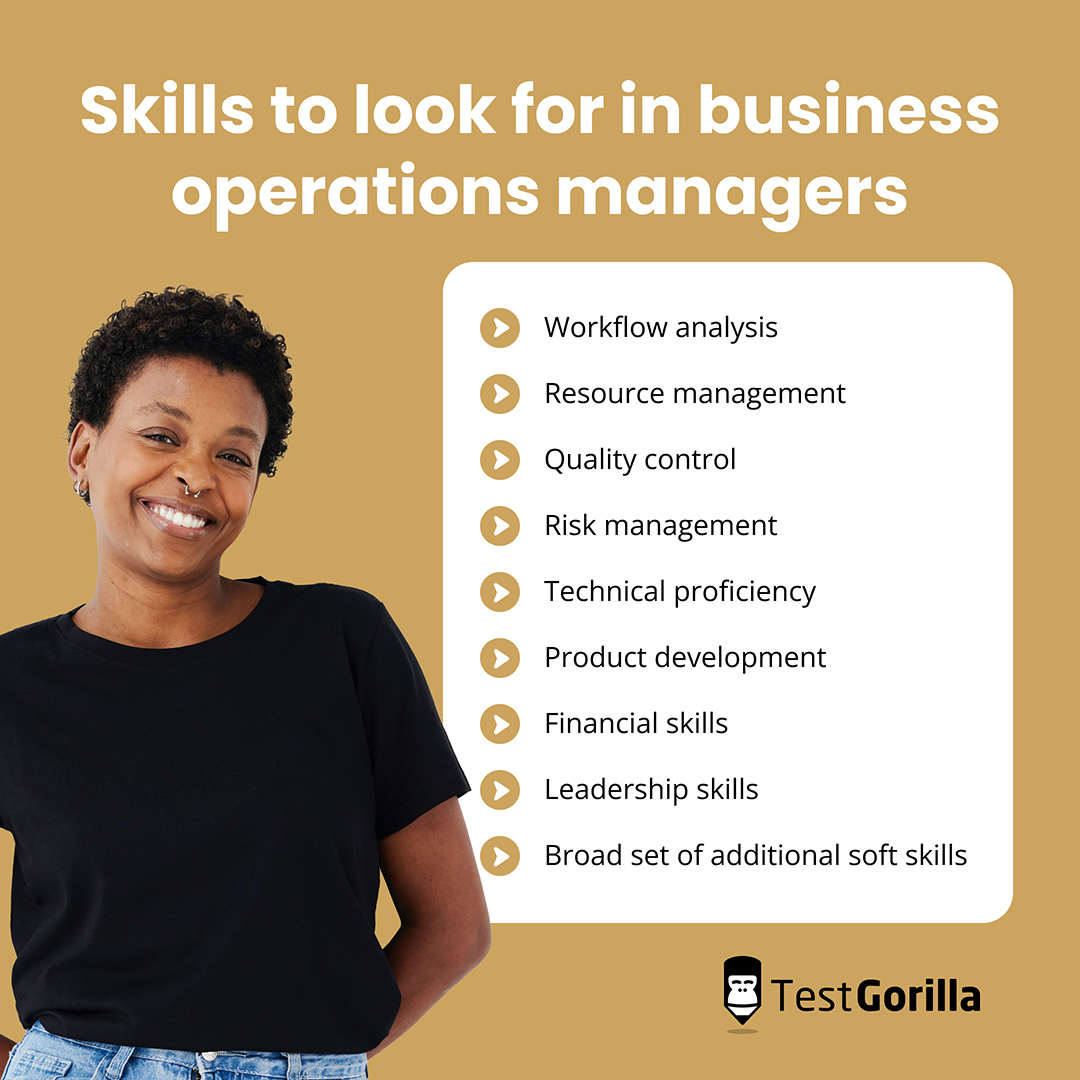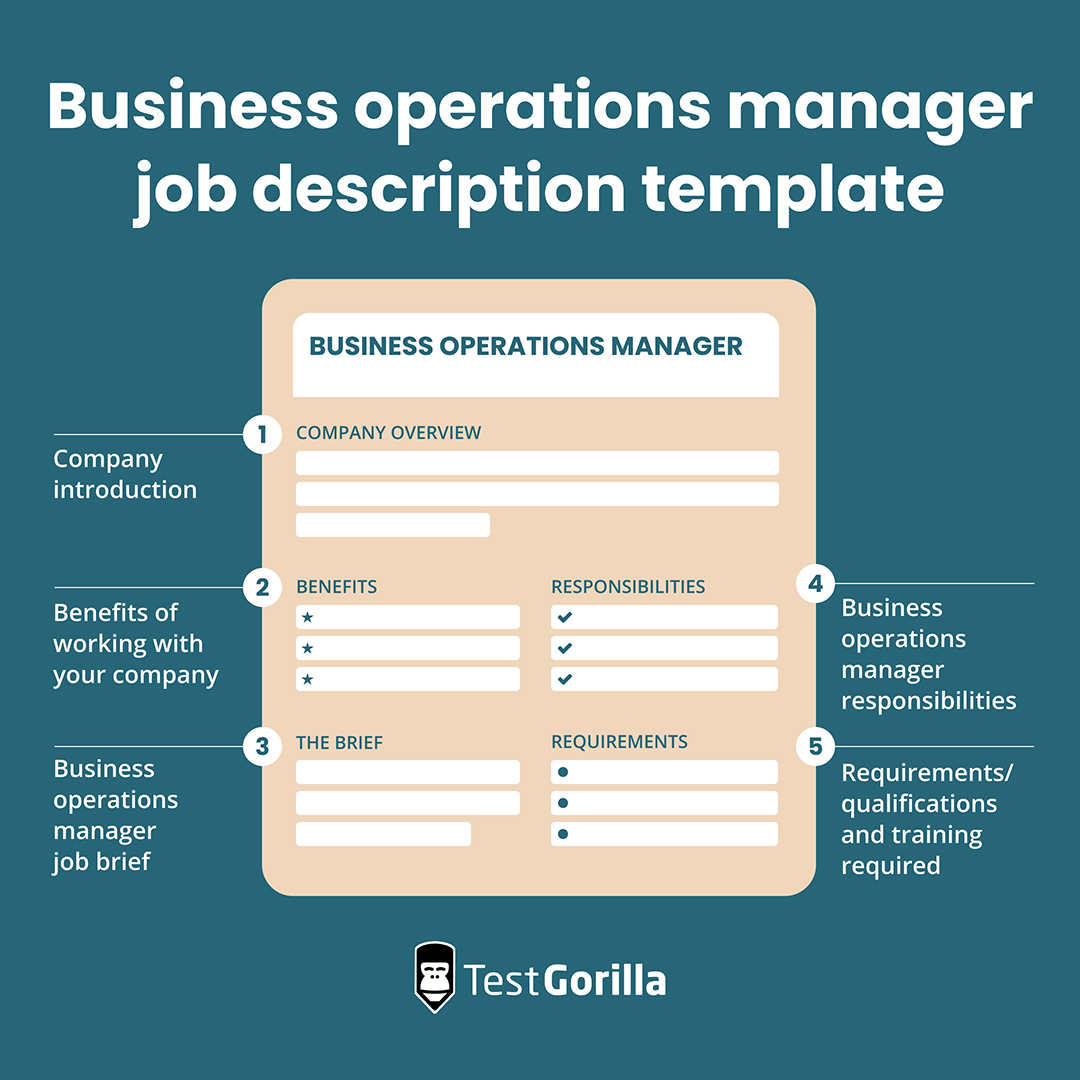Good operations managers are in high demand, which is why writing a great job description is so important. To do so, you’ll need to show that you understand the quirks and challenges of the role and that you’re able to offer an attractive work environment where talent thrives.
To craft a compelling job description that attracts the best business operations managers, you need to use the right language, speak to your company’s values, offer competitive compensation, and clearly articulate the duties and responsibilities.
Read on to find out how to write a stand-out job description for an operations manager. Plus, you can use our free template to get started today.
Table of contents
- What is a business operations manager?
- Key skills to look for in business operations managers
- Tips for an effective business operations manager job description
- Business operations manager job description template
- 2 things to avoid when writing a job description for business operations managers
- Next steps: Attracting and assessing business operations manager candidates
- FAQs
- Attract top business operations managers with TestGorilla
What is a business operations manager?
A business operations manager works across departments to ensure everyone stays connected to each other and to the company’s goals, vision, culture, and policies. This professional is responsible for making sure a company’s operations are efficient, profitable, and compliant.
Sometimes known as head operations administrators, operations managers look at the “big picture” of how a company’s products and services are produced. They take an organization’s vision and translate it into achievable, actionable goals.
Operations managers also work to improve workflows and make them more efficient. They provide teams with the resources they need to get work done. Finally, they may be involved in developing budgets, managing suppliers, hiring and training new staff—anything required to make sure operations flow smoothly.
Key skills to look for in business operations managers
Operations managers need to be able to work with every department. As a result, they typically have a very broad skillset:
Workflow analysis: This involves assessing how a product or service moves through various stages, identifying bottlenecks or inefficiencies, and devising strategies to reduce or eliminate them.
Resource management: From supply chain and inventory management to capacity planning, operations managers are responsible for ensuring the right resources, whether human, financial or physical, are at the right place at the right time.
Quality cControl: They are often directly responsible for ensuring that quality control standards are met across different stages of the production or service process.
Risk management: While all managers handle risks, operations managers focus on risks related to the delivery of products or services, such as equipment breakdowns, supplier failures, or process disruptions.
Technical proficiency: Operations managers often have to work closely with specific technologies like Enterprise Resource Planning (ERP) systems, Manufacturing Execution Systems (MES), or other operation-specific tools.
Product development. Candidates who understand Product Lifecycle Management (PLM), Design for Manufacturing (DFM), Design for Assembly (DFA), and prototyping and testing can make product development more efficient. They’ll have the knowledge to optimize manufacturing and assembly and also to verify products meet quality standards.
Financial skills. A good understanding of forecasting and budgeting are necessary to keep operations on budget. Managers should also know how to run Return on Investment (ROI) and performance metrics analyses to evaluate operational decisions.
Leadership skills. Operations managers are often the first line of defense when problems happen, so they need good emotional intelligence and crisis management skills.
A broad set of additional soft skills. Operations encompasses many different departments and ranks, has internal and external exposure, and requires flexibility, excellent communication skills, and strong interpersonal and problem-solving skills.
The best insights on HR and recruitment, delivered to your inbox.
Biweekly updates. No spam. Unsubscribe any time.
Tips for an effective business operations manager job description
Here are some tips to bear in mind:
Consider current trends and changes in your industry
A job description that reflects current industry trends and changes is more likely to attract candidates with the skills you need now and in the near future. Here are some trends to be aware of that affect operations leaders specifically:
Artificial intelligence, machine learning, and automation are being used to increase productivity, take care of routine day-to-day tasks, and reduce errors.
Vendors, employees, and customers increasingly expect multiple communication channels and one-touch resolutions to problems.
Customers are increasingly focused on speed, convenience, and accessibility.
Unified operations management platforms are growing in popularity. They allow for operations managers access to advanced tools and analytics, but can be overwhelming for the uninitiated.
Industry-specific knowledge
Operations managers have similar responsibilities across industries, but doing their job well will require a solid understanding of the ins-and-outs of your company’s industry. There may be laws and regulations to be aware of (e.g. manufacturing standards, data compliance, etc.), jargon and terminology, and industry-wide best practices.
Likewise, don't assume that all operations managers have the same technical expertise. Highlight any industry-specific or tool-specific knowledge required, whether that's familiarity with a certain ERP system or knowledge of specific manufacturing processes.
Failure to focus on these aspects could lead to a mis-hire—or at least a very steep learning curve for your new hire.
Include information on compensation
Job seekers are looking for fair compensation and may pass over job descriptions that don’t show a competitive salary.
Check competitor job ads and resources like Payscale and Glassdoor to verify your salary is in line with what operations managers in your city and/or industry are being paid. Mention any benefits, bonuses, and other perks that can make your base salary more appealing.
Business operations manager job description template
To get you started, here’s a template you can adapt for your next operations manager job ad:
Introduction to [Your Company]
[Write a few sentences, outlining what your company does and the benefits of working at your organization. Briefly explain what role the business operations manager will play in your organization’s mission and overall goals. Include a few details about your company culture.]
Job title: Business Operations Manager
Reports to: [For example: Director of Operations, COO, CEO]
Job Overview: [Write a succinct explanation of what you’re seeking in an operations manager. Outline what success looks like in this role and what a typical day might look like for the right candidate.]
Compensation: [Include information on salary range, bonuses, benefits, profit sharing, and any other incentives]
For more information, check out our detailed guide on what to pay an operations manager.
Responsibilities and duties:
Oversee day-to-day operations to create smooth workflow and ensure established procedures are followed.
Work with department leads to achieve operational goals.
Identify areas for operational improvement and implement processes to enhance efficiency, reduce costs, and ensure quality.
Work with our operations team by assigning tasks, setting performance goals, and providing ongoing and constructive feedback.
Manage resource allocation, including personnel, budgets, and tech.
Use key performance indicators (KPIs) and data analytics to create reports on the effectiveness of operations and to drive informed decision-making.
Ensure compliance with regulatory requirements.
Optimize the procurement process by establishing and maintaining strong relationships with vendors and suppliers.
Develop mitigation strategies to protect operations and reduce disruptions.
Oversee projects related to process improvement, operational efficiency, and cost reduction.
Qualifications:
Bachelor's or Master’s degree in business, operations management, business administration, or a related field (or relevant work and educational experience).
[Number]+ years in operations management, with a track record of achieving operational goals and improving efficiency, or equivalent experience.
2 things to avoid when writing a job description for business operations managers
Avoid these mistakes when writing your job description to avoid driving away qualified talent:
Vague, generic descriptions
Operations managers often oversee diverse functions, from supply chain to human resources. Clearly define their areas of responsibility to avoid overlaps or gaps with other managerial roles. Be specific about each of their duties and what’s involved.
Phrases like "team player" or "strong leadership" are generic and can apply to any manager. Focus on the unique aspects of the operations manager role, like "process optimization" or "cross-departmental collaboration for operational efficiency."
Non-compliant language
Discriminatory language is against the law in many jurisdictions, including the United States. Using language such as “seeking a recent graduate with high energy levels” can run afoul of the Age Discrimination in Employment Act (ADEA), which prohibits discrimination against job seekers over 40. As the average age of operations managers is above 40, this is an important one to keep in mind.
Make sure you use gender-neutral language, too, and avoid any language that would make applicants feel unwelcome.
Check out this free TestGorilla guide for more about hiring process compliance.
Next steps: Attracting and assessing business operations manager candidates
Now you can use your job description to recruit internally or externally by posting it on platforms such as LinkedIn and Indeed. H
But as the applications start flowing in, how can you work through the stacks of candidates to uncover the best talent?
The answer for many organizations is TestGorilla. TestGorilla is a pre-employment assessment platform that lets you objectively measure business operations management skills. Choose four to five tests from a library of more than 300, including:
Our business operations management test, which measures planning and controlling skills, inventory and supply chain management, and operations design and organization proficiency
Cognitive tests to evaluate how well operations managers can problem solve, pay attention to detail, and think critically as they try to solve complex operations problems
Culture add and personality tests, to verify candidates can fit with your teams and company culture
Situational judgment tests, to ensure operations managers will respond appropriately and quickly to different situations.
Language tests, in case your head operations administrator needs to work with multi-lingual teams or vendors
Software tests, to measure how well applicants can use different tools to improve workflows, such as using UiPath to automate processes
Situational judgment tests, which can test how effectively and ethically candidates can make business decisions about operations, negotiate with suppliers, and communicate their ideas about efficiency improvements
You can put together your first assessment in just minutes and send it out to qualified candidates.
FAQs
Should I include salary information in my job descriptions?
A competitive salary and any bonuses or benefits you can offer helps you attract top talent. Including salary information also shows business operations managers you understand the compensation expected of this role.
How can I tell if a candidate has a track record of success in similar roles?
As part of your job description and job ad, you can request references to learn how a candidate performed in a past role.
Attract top business operations managers with TestGorilla
A skilled business operations manager can help you create optimal operations strategies, improve performance, secure compliance, and more. With the right talent, all parts of your daily operations will be more efficient and profitable.
A compelling, detailed job description is the first step. Once you’ve attracted a range of candidates with your job description, though, it’s time to use TestGorilla to find the best talent. Then, you simply need to interview candidates to find the perfect match for the role. (Hint: Check out our operations manager interview questions for ideas.)
Start your journey to better operations today. Take a quick product tour to see TestGorilla’s many features in action.
You've scrolled this far
Why not try TestGorilla for free, and see what happens when you put skills first.
















